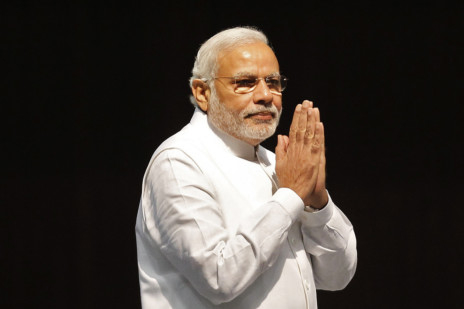
Why is Modi not reining in the fringe? His development agenda is in danger of being hijacked and obscurantist rantings are making screaming headlines. Yet, this all-powerful prime minister is silent. Are we asking the wrong question here? For the public at large is unfazed. Yes, the liberal voice is outraged, but Modi’s core constituency, which includes the many that cannot be strictly categorised as Hindu right-wingers have not deserted him. Is there something that we are all missing?
The question that should be asked is why is this majority that voted for him silent? Indeed they even appear complacent, if not gloating over this Hindu resurgence. Unreason prevails and the contagion of bigotry is spreading, yet support for Modi stands firm. Vedic myths are allowed to masquerade as science, startling claims are made that Indians invented planes 7,000 years ago. Yet, this silent majority does not see the ridiculousness of it all. Whither the scientific temper that India’s first prime minister Jawaharlal Nehru so assiduously and relentlessly espoused?
Partial answers may be found in the utterances of former premier Atal Bihari Vajpayee, who was conferred with India’s highest civilian award, the Bharat Ratna, recently. “India is an ancient nation and not a nation in the making. We are not to build a new nation, but to make this ancient nation virile to face the challenge of modern times.” This is in conflict with expressions like The ‘Invention of India’ and ‘Idea of India’ — both incidentally titles of books that received much critical acclaim. These and many other books in which Nehru is the central character point to a vision of Indianness that is fundamentally contested today. These books also seem to contest the timelessness of India.
Right-wing Hindu politician Subramanian Swamy, a one-time Harvard faculty member, provides us with more insights into this mindset that glorifies ancient India and ridicules books written by what he pejoratively calls “Nehruvian historians”. Occasionally, he also terms them as “Marxist historians” or snipes at Macaulayism (a reference to the English culture of the elite) that needs to be set on fire. Nehru’s own magnum opus — The Discovery of India — is challenged by Swamy. He takes offence to the very title for it suggests that this ancient land had to be unearthed, an artefact lost in time.
At the heart of this debate is whether a unitary state like India ever existed. Indeed to people like Swamy, the Churchillian quote “India is a geographical term. It is no more a united nation than the Equator” is pure sacrilege. And that modern India evolved out of a western construct is heresy, for all wisdom, science, statecraft and philosophical truths are birthed in ancient India.
The toxic “ghar wapsi” (home-coming) project — euphemistically called a homecoming programme for blatant religious conversion — needs to be seen through the prism of the Hindu right, which claims all Indians, whether Muslim or Christian, are primarily “converts”. Ergo a Hindu–Christian or a Hindu-Muslim! According to the Hindu right-wingers, as a race, all Indians are Hindus and the plurality of India that born-again Macaulayians like historian Sunil Khilnani talk about is a simple overlay on an unalloyed Hindu nation state that has stood the test of time.
Much of this orthodoxy has gained traction because the Hindu right has consistently stoked that old Hindu rage and shame for allowing over a thousand years of Muslim and British rule over India. But a closer examination of this charge would reveal a more textured reality. To an extent, the intemperate and unbalanced Swamy is right; Mughal emperors like Akbar are eulogised at the expense of lesser known Hindu Kings like Rana Pratap or the Sangama brothers, who founded the Vijayanagara Empire that could rival the mighty Mughal Empire. Nehru’s India also went out of the way to accommodate minority sensitivities, giving legs to the galloping majoritarianism that is visible in Modi’s India. Indeed, recent statements of a member of parliament from Hyderabad, Asaduddin Owasi, is yet another example — according to Hindu right-wingers — of “misplaced trust” in Muslims. Owasi, to counter the “ghar wapsi” programme said all Indians are Muslims. These are unwanted inflammatory assertions that play into the hands of Modi supporters.
Is then the fear that Modi’s development agenda has been hijacked by the fringe simply a media created furore? Yes, the parliament was stalled and the various bills from insurance to land acquisition to tax reform could not be passed, but the Modi government has decided to take the ordnance route to get on with the business of running the country. It feels all this uproar, including calling the assassin of Mahatma Gandhi a patriot as just a storm in a tea cup. The mantra of “development for all” is a shield that protects it from gusts of hot air whipped up by its detractors.
Public opinion is solidly behind Modi. The opposition is in total disarray and the alternatives are much worse. Even if he does not deliver on his promises he has none to fear; for he is neither corrupt nor does he have a dynasty!
Modi needs to fear history, though.
Ravi Menon is a Dubai-based writer, working on a series of essays on India and on a public service initiative called India Talks.








